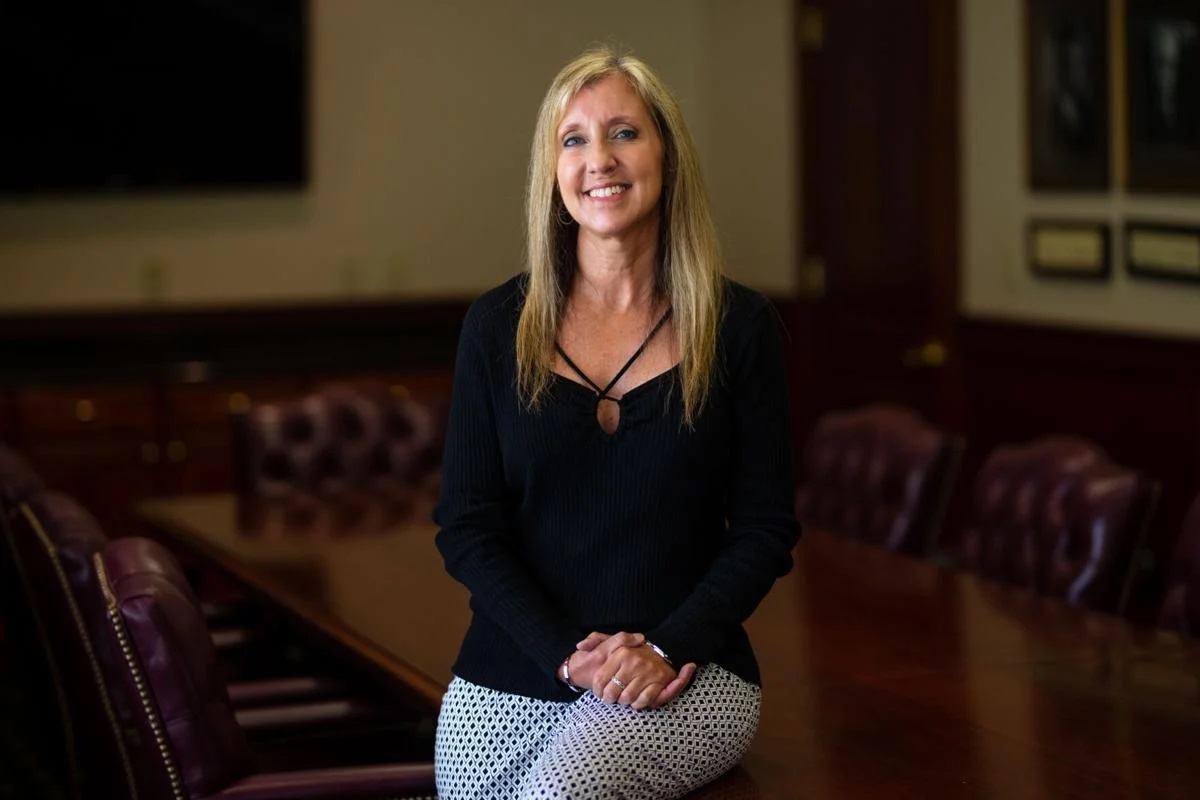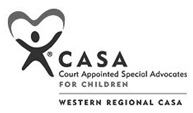Local nonprofit director’s passion, leadership has changed kids’ lives for 30 years

Kimberly Wilds is celebrating 30 years at Court Appointed Special Advocates (CASA). 202306xx wilds 01.jpg Sholten Singer | The Herald-Dispatch
By DESTINEY DINGESS ddingess@hdmediallc.com
Jul 9, 2023
HUNTINGTON — In June, Program Director Kim Runyon Wilds celebrated 30 years with
Western Regional CASA, a court-based child advocacy program of TEAM for West Virginia Children.
Western Regional CASA (Court Appointed Special Advocates) staff and volunteers advocate for children in foster care. After children are removed from their home of origin due to abuse or neglect, CASA volunteers are appointed by circuit court.
Volunteers and staff meet with the children regularly to support them through the foster care and court process and advocate for the children’s best interests by making recommendations to the court to meet any needs. Volunteers are screened and trained before working.
Western Regional CASA serves 10 counties: Cabell, Wayne, Putnam, Kanawha, Boone, Lincoln, Mason, Jackson, Roane and Calhoun.
After graduating from Marshall University with a bachelor’s degree in criminal justice, Wilds was working on her master’s in criminal justice when a professor connected her to CASA. Wilds originally started working with CASA because she always wanted to work in child welfare and thought the position was a good fill-in while she thought about what she wanted to do in the future.
“I just fell in love with the program,” Wilds said. “I fell in love with how an individual in a community can make a difference in that community.”
When Wilds started as a volunteer supervisor at Western Regional CASA on June 7, 1993, the organization was the only CASA program in West Virginia, solely based in Cabell County, and consisted of just three full-time staff members and a part-time administrator.
Thirty years later, Wilds has led the program through the expansion of CASA in nine counties, five of which have family treatment courts, six volunteer supervisors, a trainer, herself as program director, and a variety of programs, the most recent being the aftercare program.
The aftercare program supports permanent families after court cases close and the service providers are gone. The program helps families for up to a year if they have questions, if they have concerns, or if any stressors come back. CASA can offer the family support and links to resources to keep the family healthy and prevent a future petition from being filed from child abuse and neglect, juvenile petition or to help the family in any way that they need that’s voluntary.
The national CASA logo is “change a child’s story,” and “I’ve always liked that because I really think we do. Kim has changed the story for countless kids and there are cases that she works even now as a program director,” Alison Gerlach, CASA volunteer supervisor, said.
She will still take on cases and meet with kids a lot of people would view themselves three steps above that but she doesn’t, Gerlach said.
“To expand the number of kids Western Regional CASA has touched, to make sure that the staff that she hires is well supported and well trained — it really trickles down to the whole program,” Gerlach said. “Everything we do at CASA has a drop of Kim in it; every kid’s life that gets changed even with a volunteer at CASA. There’s a drop of Kim in that.”
Wilds said she works with any victim of crime, especially the most vulnerable, which are children.
She enjoys her position as program director because she gets a good balance of direct service with the children during home visits and a day or two of working on administrative work. Not having to read about children experiencing trauma daily at work has helped her longevity at CASA, she said.
Dennis Frasher, CASA volunteer supervisor, has been working with Wilds at Western Regional CASA for almost 19 years. He started working at CASA after retiring from a job he worked at for decades and says out of all the jobs he’s worked he’s had a lot of good managers but Wilds is the best.
“For many years it was just she and I,” Frasher said. “It’s just been an awesome experience working for her. She’s so focused, passionate about what she does and smart. She keeps us all pointed in the right direction.”
Wilds said it can be hard working with abused and neglected children and then having to clock out at 5 p.m. and go home and have a personal life. Sometimes you go home thinking about the children and questioning if you made all the right decisions in advocating for the child, she said.
Wilds stresses to all her staff that it’s important to have a life outside of work and a healthy balance for themselves.
One thing people may not know about her is how much she cares for her team, Gerlach said. The volunteer supervisors take care of the volunteers, the volunteers take care of the kids and she very much takes care of her staff, Gerlach said.
“For the program for the children that we serve, there has to be a healthy balance between personal life and work life to continue in this field,” Wilds said.
The most severe cases get taken to court, and having to see pictures, read about kids getting abused and neglected, and be exposed to the child’s living situations is a constant in the life of a CASA employee. To combat the sad parts of the job, Wilds said her favorite part of her job is when children are permanently placed back home with their parents, with family members or foster parents.
“When children know that they are in their forever home, whatever that home is, they don’t have to worry about what happens at court or about visits from CASA, CPS or anyone else. They know they’re home, this is their home, and nobody is going to take them out of this home,” Wilds said.
Wilds and her team call this “the warm fuzzies.” After they get back from an adoption final hearing or parents get reunited with their children, they will call it their “warm fuzzy” for the week.
“That’s what has kept me here all these years, seeing children in their forever homes,” Wilds said.
Her favorite warm fuzzy moment was when an older teenager’s adoption was finalized before he turned 18. All adoptions are good days, and reunifications are also good days, but it’s harder to adopt an older teenager, and this teenager was adopted shortly before he became legally an adult; that was just a fabulous day, Wilds said.
“It’s harder for older teenagers to get adopted compared to younger kids, and every child, every teenager, needs a home. They need a permanent home,” Wilds said. They need a permanent place to run to when they’re older, or if the child decides to go to college, they need a place to stay during the weekends and breaks. She said that children need to know at any age, they have a family and home to go to.
“People will ask me how many kids have you impacted — two, three or four? I’m sure we did, but then I get to really counting and there’s dozens,” Frasher said. “ Every case we get involved in we make a difference some monstrous and some not so big.”
Seeing any child abused or neglected is hard, but Wilds said the hardest part was raising her son, Noah, and she had to read about kids her son’s age being abused or neglected. She said it was easier to visualize certain characteristics the child would have.
“I don’t know why of all the types of maltreatment, but what affected me the most was when it was a child that went hungry and if they were the same age as my son Noah. That was just very hard for me. To continue to read the petition about what happened to that child, I did, but it was tough and stuck with me,” Wilds said.
Wilds earned her master of social work degree in 2014 while leading and expanding Western
Regional CASA. During her 30 years at CASA, Wilds said she learned about human behavior. Working at CASA has opened her eyes to why and how people act. She’s always been interested in why people do what they do, but during her last 15 years at CASA she learned there’s usually a reason a parent who ends up with children has a petition filed against them in court.
Some parents may have a substance use disorder or come from homes where they were abused and neglected and couldn’t receive help to process their trauma because it wasn’t available, or they lived in a rural area that doesn’t have the resources to help them.
“When I first started, it was a thought in the child welfare field that it was something deliberate; it was intentional. Parents will deliberately neglect their children, but there is usually a reason for what they do,” Wilds said. “Maybe they weren’t shown the right way to parent; they don’t have coping skills to address life’s stressful moments.”
Gerlach and Frasher both say Wilds is not only passionate for advocating for abused and neglected kids, she’s also smart, kind, funny and leads by example.
“Ultimately in the end the abused and neglected children in this area are so much better off because of Kim because of her passion because of her leadership not only does she walk the walk she talks the talk, she’s a true passionate person who cares about abused and neglected children,” Frasher said.
Wilds said CASA is her calling.
“I work with people who feel this is their calling. Knowing that they believe that an individual can make a difference in a child’s life, and they can,” she said. “Another reason I’ve been here for 30 years is the staff I’ve hired; they truly believe that one person can make a difference, and the volunteers also believe that. Knowing my volunteers believe in the program to invest their time and emotions and having staff so committed to the volunteers and trying to get these children to permanency is a big reason I’m not ready to retire anytime soon.”
https://www.herald-dispatch.com/features_entertainment/local-nonprofit-director-s-passion-leadership-haschanged-kids-lives-for-30-years/article_912eebf8-bf3d-5475-8096-2f0f851f3e09.html






